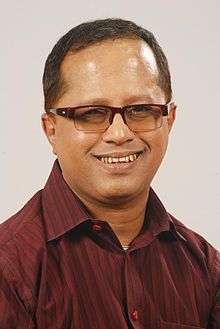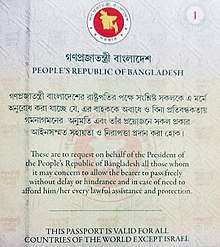Salah Choudhury
Salah Uddin Shoaib Choudhury (born 12 January 1965) is the editor of the Bangladeshi tabloid Weekly Blitz.[3][4]
Salah Uddin Shoaib Choudhury | |
|---|---|
সালাহ উদ্দিন শোয়েব চৌধুরী | |
 Choudhury in 2011 | |
| Born | Salah Uddin Shoaib Choudhury 12 January 1965 Sylhet, East Pakistan, Pakistan |
| Nationality | Bangladeshi |
| Occupation | Journalist |
| Organization | Weekly Blitz |
| Criminal charge(s) | Smuggling information out of the country,[1] sedition[2] |
| Criminal penalty | Imprisonment |
| Criminal status | Convicted for 3 months[1] and for 4 years[2] |
In 1996, he established the first private television channel in Bangladesh, A-21 TV. He has been physically assaulted three times and kidnapped once in Bangladesh due to his anti-jihadist views and his inclination to work with Israel to create an intercultural understanding between Israel and the Islamic world.[5]
Controversy
Salah Uddin Shoaib Choudhury was arrested on 29 November 2003, while trying to attend a seminar in Tel Aviv on the invitation of International Forum for the Literature and Culture of Peace. He was charged with sedition, treason and blasphemy in 2003. A case was filed against him on 24 January 2004 by Mohammad Abdul Hanif, head of Airport Police Station of Dhaka, who claimed that he was a Mossad agent based on the documents found in possession. On 9 January 2014, he was convicted by a Dhaka court of sedition under section 505 (A) of Bangladesh's Penal Code.[6][7]
In March 2011, Aryeh Yosef Gallin, founder and president of the Root and Branch Association which is a nonprofit group that promotes co-operation between Israel and other nations, expelled Choudhury from its Islam-Israel Fellowship after reports surfaced that the Bangladeshi had bilked "emotionally vulnerable single Jewish ladies" out of tens of thousands of dollars.[8]
On 7 November 2012, the Dhaka court sent Choudhury to jail, in connection with an embezzlement case filed by his business partner Sajjad Hossain, chairman of Bangladesh Center for International Studies. He was convicted in 2015 by the Chief Metropolitan Magistrate court and sentenced to four years of rigorous imprisonment.[9][10]
Publications
Choudhury has written a number of books in Bengali and English. His latest book, Injustice & Jihad, was published in October 2007. In May 2008, Italian publication house Neftasia published Choudhury's book titled Non Sono Colpevole in Italian. This was the first book by any contemporary Bangladeshi journalist translated into Italian.[11]
He has been interviewed in a documentary film titled 'America At Risk', which was produced by Citizens United Productions, USA.
Inside Madrassa was published in October 2009 in Bangladesh. In this book, Choudhury gave extensive information on madrassa education, including unknown facts, Jihadist orientation inside madrassa, hate speech and many other important thus interesting topics, mostly related to radical Islam.
Choudhury opened a branch of the Israel-based International Forum for Literature and Culture of Peace. He wrote about the rise of al-Qaeda in Bangladesh and has written articles critical of anti-Israeli and antisemitic attitudes in Muslim-majority countries.[12]
He has been writing against Islamist militancy groups in South Asia https://www.afternoonvoice.com/what-the-kashmiris-exactly-want-part-ii.html]. He writes for various international newspapers and journals on diversified topics.
Salah Uddin Shoaib Choudhury is quoted by prominent newspapers such as The Hill around the world.
He also is invited by various international organizations and educational institutions for lectures on topics related to radical Islam, anti-Semitism and Islamist militancy.
Assaults
In July 2006, a mob stormed the premises of Choudhury's tabloid and beat him, fracturing his ankle.[13] In September, a judge ordered the case continued, in spite of the government's reluctance to prosecute, as Choudhury had "spoiled" the "image of Bangladesh" and "hurt the sentiments of Muslims" by lauding Jews, Hindus and Christians. After the police detail that had been posted to Weekly Blitz's offices since the July bombing had vanished, the offices were ransacked and Choudhury was badly beaten by a mob. When he lodged a formal complaint with the police, an arrest warrant was issued for him. The US Embassy in Dhaka sent an observer to his trial.[14]
Later, Choudhury lodged a case in the Court of Metropolitan Magistrate against the attackers, mostly belonging to the Cultural Wing of the Bangladesh Nationalist Party (BNP).[15]
On 18 March 2008, members of Rapid Action Battalion (RAB) abducted Choudhury from his office at gun point. He was blindfolded and taken to RAB office. In the late hours, he was released. Series of written complaints were sent with the military controlled interim government on this incident, but no action was ever taken by the Bangladesh authorities against the RAB men.[16][17]
The same month, the military-controlled interim government withdrew police protection from Choudhury's residence.
On 22 February 2009, armed thugs claiming to belong to ruling Bangladesh Awami League entered Choudhury's office, ransacked the entire office and physically assaulted him and other members of the Weekly Blitz newspaper.[18]
Treason charges

Choudhury is facing charges of sedition, treason, blasphemy and espionage since January 2004 for having tried to attend a conference of the Hebrew Writers' Association in Tel Aviv. He violated the Passport Act, by attempting to travel to Israel in November 2003. The Act forbids citizens from visiting countries with which Bangladesh does not maintain diplomatic relations, usually punishable by a fine of $8. It may be mentioned here that Bangladesh currently does not have diplomatic relations with Taiwan and Israel. However, the travel ban on Taiwan was silently lifted while people started business with Taiwan in spite of the travel ban. On 29 November, he was taken into police custody[19] and, as he tells it, blindfolded, beaten and interrogated for 10 days in an attempt to extract a confession that he was spying for Israel. He spent the next 17 months in solitary confinement, and was denied medical treatment for his glaucoma. On intervention of US Congressman Mark Kirk, who spoke to Bangladesh's ambassador to the US, Choudhury was released on bail, though the charges were not dropped.[14]
Weekly Blitz
Choudhury is the editor of English newspaper Blitz, and editor-in-chief of Bangla weekly Jamjamat.
His articles appear in various international press on a regular basis. He is also considered to be an expert on topics such as Islamist militancy and extensively works on finding the root cause of jihad. He is also invited by many reputed institutions around the world as a speaker to give lecture on such topics as Islamist militancy, jihad, hate speech and political Islam.
Views on Islam
Choudhury rejects the assertion by Geert Wilders that there are moderate Muslims, but no moderate Islam. "My Islam derives from the Koran. This teaches that Muslims, Jews and Christians will all be rewarded for good deeds and punished for evil," he has said.[20]
Arrest
Choudhury was arrested on 29 November 2003 at Dhaka airport when he was found to be carrying discs and papers containing information on "sensitive issues including minority repression and the al Qaeda network in Bangladesh".[21] His movements had been monitored for some time, on suspicion of his connection with the Israeli secret service Mossad.[21]
After release from 17 months imprisonment, Choudhury wrote in an Israeli newspaper, "I also stand before you perhaps as a living contradiction: a Zionist, a defender of Israel, and a devout, practicing Muslim, living in a Moslem country... I believe in the justice of the Zionist dream. I also acknowledge this historical reality: that the world has endeavored to crush that dream and, yes, even to destroy the viability of the Jewish people. At the same time, I live in an environment where people believe just as passionately in an opposing view—one that sees Israel as illegitimate; and the Jewish people as evil incarnate."[22]
Choudhury's father Ghulam Ather Choudhuri died on 29 March 2003, while his mother Sharifa Choudhury died on 9 August 2005. He was in prison when his mother died. The then-government in Bangladesh refused a petition by his family for him to attend his mother's funeral.[23]
Inqilab Television
Choudhury was the managing director of Inqilab Television, a private television venture run by a major publication the Daily Inqilab. He was also a correspondent for the Daily Inqilab. He owned a 30% stake, worth approximately $1 million according to Choudhury, in Inqilab Television. He claims his ownership share in the station was sold without his consent. In a court appearance, Choudhury claimed that his arrest was motivated by the financial dispute over his ownership stake in Inqilab Television.
Support for Choudhury
The campaign to get the government of Bangladesh to drop all charges against Choudhury was led by Dr. Richard Benkin. Benkin, like Choudhury, is an advisory board member of the Islam-Israel Fellowship.[24] Benkin and Choudhury together formed Interfaith Strength to disseminate information about Choudhury's case.
The European Parliament moved a Motion For Resolution on 14 November 2006, in defense on Salah Uddin Shoaib Choudhury.
US House Resolution 64
On 15 February 2007, House Resolution 64[25] passed the United States House Committee on Foreign Affairs without opposition. The resolution, introduced by Representatives Mark Kirk (R-IL) and Nita Lowey (D-NY), called on the government of Bangladesh to drop all charges against Choudhury, who was charged with sedition for writing pro-Israel reports. The penalty for conviction could be death. The vote on the resolution was held on 13 March 2007 and the resolution passed by a vote of 409 to 1, with 4 members voting present.[26]
Impact
Choudhury and the Weekly Blitz have influenced government policy and popular opinion in Bangladesh. The articles have prompted the Bangladeshi government to ban the Islamist group Hizb-ut Tahrir and the antisemitic publication Dajjal, which is published by another notorious Islamist militancy group, Hizbut Towhid. A campaign against Zakir Naik led Britain and Canada to refuse him entry.[20]
References
- "Man with 'Mosad links' held at ZIA". The Daily Star (Bangladesh). 30 November 2003.
- ""Journalists Imprisoned in 2017 - Salah Uddin Shoaib Choudhury"". Refworld(United Nations High Commissioner for Refugees). 31 December 2017.
- "About Us". Weekly Blitz. Dhaka. 15 February 2012. Archived from the original on 16 February 2012. Retrieved 21 December 2015.
- International Federation of Journalists (11 July 2006). "Office of controversial magazine Weekly Blitz bombed, Bangladesh". Centre for Independent Journalism. Archived from the original on 28 September 2007.
- "Stand up for Salah Choudhury". ajc.org. 14 January 2014. Retrieved 28 April 2014.
- Shoaib jailed for sedition
- Journalist gets seven-year jail sentence for decade-old articles
- Luxner, Larry (13 June 2012). "The unfathomable life of Salah Uddin Shoaib Choudhury". The Times of Israel.
- "Blitz editor sent to jail". The Daily Observer. 20 February 2015.
- "Blitz editor sent to jail". The Daily Star. 10 November 2012.
- "Non sono colpevole Choudhury Salah U." (in Italian). 25 April 2008.
- Bangladesh: Journalist detained, The Committee to Protect Journalists, 3 December 2003
- Michael Freund, US slams trial of Bangladeshi newsman Archived 24 March 2007 at the Wayback Machine, Holiday International, 3 November 2006
- Darkness in Dhaka – A gadfly Bangladeshi journalist runs for his life by Bret Stephens, The Wall Street Journal, 15 October 2006
- Wall Street Journal
- CFP
- Assam Tribune
- CFP
- Country Reports on Human Rights Practices – 2003, U.S. Department of State, Bureau of Democracy, Human Rights, and Labor, 25 February 2004
- Bangladesh's Muslim Zionist on trial The JC, By Brian Sacks, 2 September 2010
- Man with 'Mosad links' held at Shahjalal, The Daily Star, 30 November 2003
- Shoaib Choudhury, Salah Uddin (13 June 2005). "A letter from a friend of Israel". Israel Insider. Archived from the original on 26 December 2005. Retrieved 19 June 2010.
- "Archived copy" (PDF). Archived from the original (PDF) on 27 July 2011. Retrieved 8 April 2011.CS1 maint: archived copy as title (link)
- Bio of Dr. Richard Benkin, Interfaith Strength
- House Resolution 64
- "Final Vote Results for Roll Call 139". Office of the Clerk. U.S. House of Representatives.